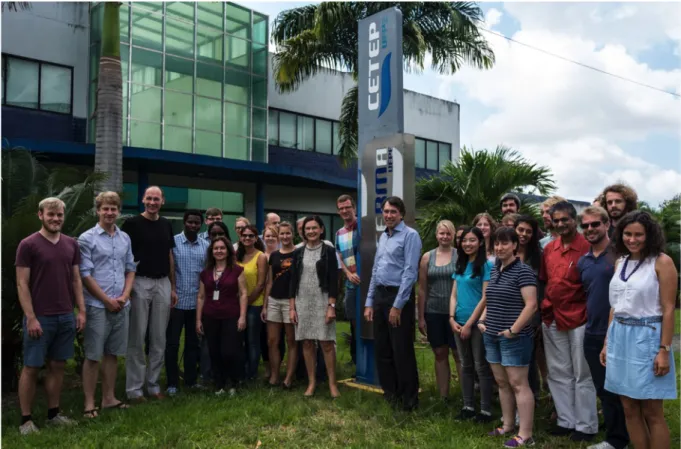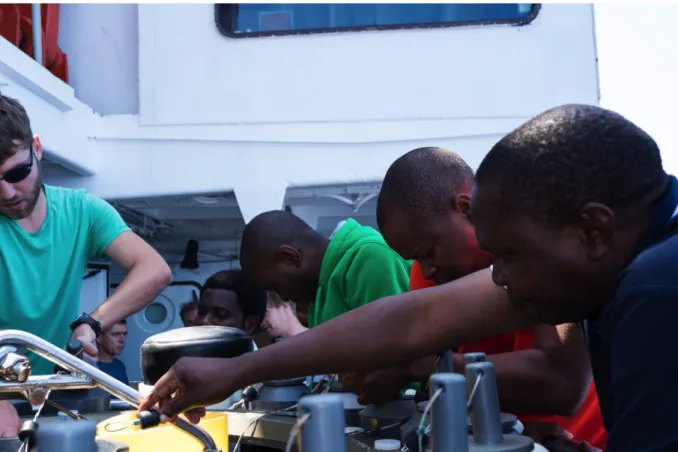Prof. Dr. Peter Brandt Meteor cruise 131
1st Weekly Report M131, Recife-Walvis Bay
Oct. 7-Nov. 12 2016
METEOR cruise M131 from Recife to Walvis Bay began on October 7 2016. The cruise continues measurements carried out during the previous research cruise M130 from Mindelo to Recife, which was led by Marcus Dengler (GEOMAR). The port stops in Recife are often used by our groups to perform together with our scientific partners from the Universidade Federal de Pernambuco in Recife common scientific colloquiums aimed at enhancing the scientific and technical exchange between students, scientists and technicians. This year, on October 5th, we had already the fifth Seminar of the Bilateral Cooperation DOCEAN (Departamento de Oceanografia) – GEOMAR. This time the German Consul General Maria Könning-De Siqueira Regueira participated. She welcomed the scientists and stressed the importance of the visit of the German RV METEOR in Recife. She stated that „science is a fundamental pillar of the cooperation between Brazil and Germany“ (Fig. 1).
Fig. 1: Participants of the 5th Seminar of Bilateral Cooperation DOCEAN – GEOMAR in Recife with the Consul General Maria Könning-De Siqueira Regueira (middle) (Photo: SvN).
On October 6th, a group of school kids from the „Colegio Apoio Recife“ visited us aboard METEOR. They had the possibility to look around the research vessel.
Prof. Dr. Peter Brandt Meteor cruise 131
Particularly interesting they found our autonomous robots, which we will deploy later off Angola and Namibia. The research cruise M131 started the next day at 9:30 with the departure of METEOR from the port of Recife. The cruise is part of the EU project PREFACE and the BMBF cooperative project SACUS. The core theme of these projects is the coastal upwelling system off Southwest Africa. Both projects include a close cooperation between German partner institutes, i.e. GEOMAR in Kiel and IOW in Warnemünde, and researchers and institutes from different countries in southern Africa. Therefore, we could welcome colleagues from Angola, Namibia and South Africa aboard METEOR. Together, we want to study ocean and climate variability and their impact on the biological productivity and fisheries, which is of high relevance for those countries.
Besides the focus on the eastern boundary upwelling system, the first part of the cruise is devoted to the study of hydrography and circulation along 11°S between Brazil and Angola. These measurements are part of the BMBF cooperative project RACE, which is particularly aimed to study the variability of the Atlantic meridional overturning circulation. This circulation is characterized by a northward warm water transport, supplying - after crossing the equator - the Gulfstream and the North Atlantic Current and the return flow of cold North Atlantic Deep Water produced in the Labrador Sea and the region north of the sills between Greenland, Iceland and Scotland. During our cruise, we continue measurements started during M130 at the western boundary of Brazil along the 11°S section into the interior Atlantic. We particularly collect data on station with the CTD (conductivity, temperature, depth) probe (Fig. 2) as well as underway with an Underway CTD system. Both instruments as well as the shipboard 38kHz and 75kHz ADCPs (acoustic Doppler current profilers) operates properly.
Prof. Dr. Peter Brandt Meteor cruise 131
Fig. 2: Work at sea usually starts with a briefing for the different instrumentation used during the cruise, here it is the preparation of the CTD probe before the station work (Photo: SvN).
After the first days at sea, which are often quite exciting, a routine working atmosphere has been established including hourly measurements with the Underway CTD system and occasionally CTD stations. Overall, all participants immediately felt at home aboard METEOR. Particularly our cruise participants, who are sailing for the first time with METEOR, were deeply impressed by the technical capabilities and also the quality of life aboard this research vessel. Thus, the very good mood aboard is not surprising. It is even enhanced by the excellent working atmosphere and great cooperation with captain Rainer Hammacher and his crew of METEOR.
Greetings from the tropics,
Peter Brandt and the cruise participants of M131

